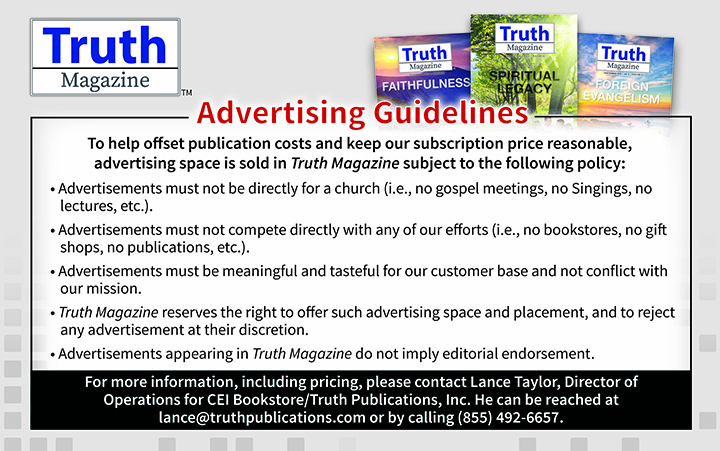

by Mark Mayberry
Synopsis: Although many evidence a casual attitude toward Sacred Scripture, Mark encourages us to develop a hunger for the truth, to eagerly hear and readily heed heaven's message.
The expression, "Truth or Consequences," is a part of our collective consciences. Truth or Consequences (T or C) is the name of a small city located in Sierra County, New Mexico. It has frequently been noted on lists of unusual place names, along with Rough and Ready, CA; Boring, OR; and Bug Tussle, TX. Truth or Consequences was the name of a goofy American game show that first aired on radio (1940-1957) and later on television (1950-1988).
Truth or Consequences also communicates an important biblical message. Paul described God's gracious message of salvation as "the word of truth, the gospel" (Col. 1:5-6). Coming to a knowledge of the truth is a vital part of the salvation process (1 Tim. 2:3-4). According to the Lord Jesus Christ, entrance into the kingdom of heaven is conditioned upon one's willingness to be "born again," i.e., of water and the Spirit (John 3:3, 5). James describes this birth process, saying, "In the exercise of His will He brought us forth (Greek: apokueō—brought into being) by the word of truth" (Jas. 1:18). During His earthly ministry, Jesus was saying to those who believed Him, "If you continue in My word, then you are truly disciples of Mine; and you will know the truth, and the truth will make you free" (John 8:31–32).
Those who believe and know the truth gratefully share in the physical and spiritual blessings that God bestows upon humanity; those who pay attention to deceitful spirits and doctrines of demons forbid the same (1 Tim. 4:1-5). Seeking divine approval instead of self-justification, faithful Christians endeavor to accurately handle the word of truth (2 Tim. 2:15). In the original Greek, the word orthotomeō, translated "accurately handle," means "to cut straight" (Thomas 3718). BDAG points out that it is found elsewhere, outside of the New Testament, only in Proverbs 3:6 and 11:5, where it is used with hodos (a way, road), and "plainly means 'cut a path in a straight direction' or 'cut a road across country (that is forested or otherwise difficult to pass through) in a straight direction', so that the traveler may go directly to his destination." In this context, it probably means "guide the word of truth along a straight path (like a road that goes straight to its goal), without being turned aside by wordy debates or impious talk." In contrast, wicked individuals (such as Hymenaeus and Philetus) go astray from the truth and upset the faith of some. Such worldly and empty chatter leads to further ungodliness and spreads like gangrene (2 Tim. 2:16-18).
Wicked men will face the consequences of not loving or believing the truth (2 Thess. 2:7-12). Lacking a love for eternal and enduring truth, such individuals accumulate teachers who will condone their sinful desires. In so doing, they "turn away their ears from the truth and will turn aside to myths" (2 Tim. 4:3-4). What is a myth? It is a fictional narrative of human contrivance standing in opposition to logos, i.e., the truth of divine revelation. Those who pursue this course experience the temporal consequences of exchanging the truth of God for a lie, suffering perceptual impariment and moral depravity (Rom. 1:24-25). Furthermore, they will face the eternal consequences of not obeying the truth: storing up for themselves wrath, indignation, tribulation and anguish (Rom. 2:5-11).
What about the righteous? Adopting the characteristics of agape love, faithful Christians do not rejoice in unrighteousness but rejoice with the truth (1 Cor. 13:6). Removing sin from their fellowship, faithful Christians must celebrate the feast, not with old leaven, nor with the leaven of malice and wickedness, but with the unleavened bread of sincerity and truth (1 Cor. 5:6-8). Recognizing the value of truth, the prudent acquires knowledge (Prov. 23:23). He buys the truth and refuses to sell it, counting it as a very long-term investment (Prov. 23:23; Matt. 13:44).
Some, like the Pharisees and scribes, invalidate it by adding to or subtracting Sacred Scripture (Matt. 15:3-6). By denying the all-sufficiency of the gospel and binding circumcision on Gentile converts, the Judaizers adulterated it (2 Cor. 4:1-2).
Some demonstrate a casual and callous attitude toward the Word by persistently refusing to hear and heed heaven's message; like ancient Israel, they abandon the Lord, to their shame and ruin (2 Chron. 24:17-19; Isa. 28:9-13).
Others manifest a casual attitude toward the Word by loving error more than truth, accepting man's authority above that of God, and refusing to walk in God's ways. "An appalling and horrible thing has happened in the land: The prophets prophesy falsely, and the priests rule on their own authority; and My people love it so!" Such rebellious behavior leaves one without defense in the day of judgment: "But what will you do at the end of it?" (Jer. 5:30). Again, thus says the Lord, "Stand by the ways and see and ask for the ancient paths, Where the good way is, and walk in it; and you will find rest for your souls. But they said, 'We will not walk in it'" (Jer. 6:16).
Some demonstrate a casual attitude toward the Word by hating those who faithfully proclaim God's message. Wicked King Ahab said to Elijah, "Have you found me, O my enemy?" (1 Kings 21:20). Concerning Micaiah, he said, "I hate him, for he never prophesies good concerning me but always evil" (2 Chron. 18:4-7).
Others demonstrate a casual attitude toward the Word by being wearied by worship; Malachi denounced those who disdainfully sniff at God's table, offering the lame and the sick, saying, "My, how tiresome it is!" (Mal. 1:12-14).
Some demonstrate a casual attitude toward the Word by having itching ears and lustful hearts; they accumulate teachers who tell them what they want to hear (2 Tim. 4:1-5). The peril of having closed ears, blind eyes, and dull hearts is to become insensitive and unresponsive to the warnings of Sacred Scripture (Jer. 6:10; Matt. 13:13-15).
How do we approach the word of God? Some self-serving individuals peddle it; others, like Paul, sincerely proclaim it (2 Cor. 2:17; Col. 1:25-29). Some skeptically scoff and ignore it (2 Pet. 3:3-7); others are willing to suffer so that the word of God might be shared with a lost and dying world (2 Thess. 3:1; 2 Tim. 2:8-10). Some, like Sergius Paulus, proconsul of Salamis, seek to hear it (Acts 13:6-7); others, like Bar-Jesus/Elymas the magician, attempt to turn honest seekers away from the truth (Acts 13:8). The open-mindedness of the former starkly contrasts with the manipulativeness of the latter (Acts 13:9–12).
What is your attitude toward the word of God? Do you hear and obey it (Luke 11:27-28)? Do you honor—or dishonor it (Titus 2:4-5)? Like believers in the New Testament era, will you obey it (Acts 8:14), accepting it for what it really is, "the word of God, which also performs its work in you who believe" (1 Thess. 2:13)?
Author Bio: Mark and Sherelyn have labored with the Adoue Street church of Christ in Alvin, TX since 1998, where he serves as the evangelist and an elder. The church website is ascoc.org. His Bible study website is markmayberry.net. He can be reached at mark@truthpublications.com.
